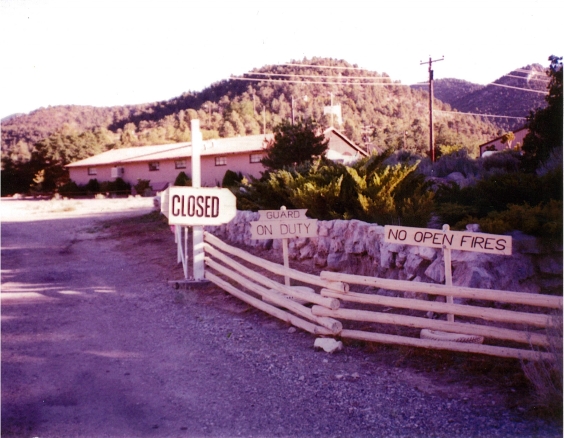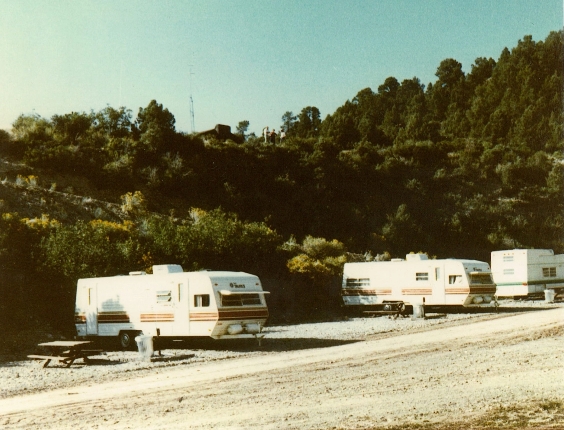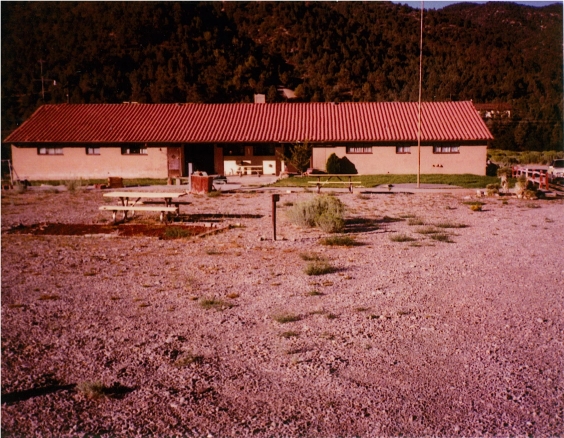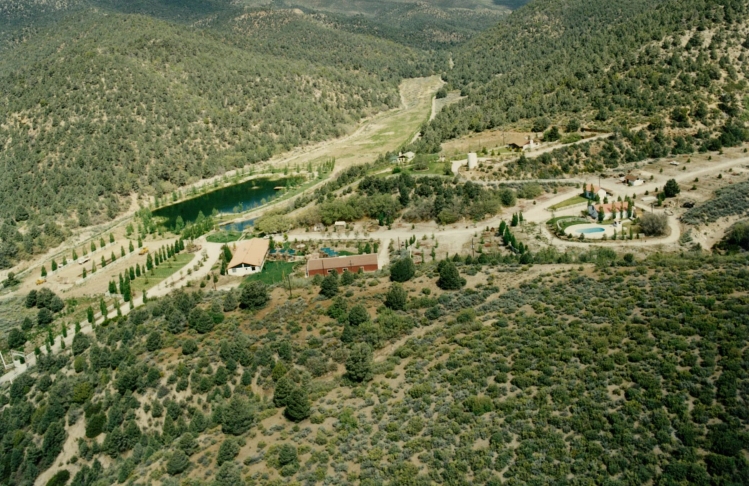History of Torino Ranch
History of Torino Ranch
Torino Ranch sits on land that has a diverse and fascinating history dating back to the original inhabitants, who were Paiute Indians.

In 1933, in the depths of the Great Depression, Charlie and Rachael Roberts moved to the 160-acre homestead on the slopes of Mt. Charleston, NV from Los Angeles. They called it Roberts Ranch, and there they lived and worked a cattle and dude ranch for more than 14 years. Lore has it that their Ranch was near an illegal whiskey still on Lovell Canyon road that has been called “Potato Row” in the time of Prohibition.
After the Roberts’ passed on, legend states that the ranch became a boys’ detention center, where young men were sent and put to work for behavioral rehabilitation. But perhaps its most famous owner, prior to Brett Torino, was Bill “Wildcat” Morris, a prominent lawyer and former owner of the Landmark Hotel-Casino.

Under Morris’s ownership, the Lovell Canyon property operated as an RV park with approximately 1,800 campers who paid a membership fee to enjoy the small watering hole he built on the property, as well as the jamborees and other outdoor activities and events held there. Unfortunately Morris let the property fall into bankruptcy, and when the RV Park was shut down, some members were so angry at losing their money that they burned and destroyed everything they could.
They shot the water tower full of bullet holes, stripped the copper wiring, and stole the plumbing and anything else of value from the few buildings on the property. When the watering hole dried up, the Ranch effectively became a garbage dump.
When Brett purchased the 162 acre Ranch in 1994, it was in a tremendous state of disrepair. But as the son of a real estate developer having spent his high school years working on construction sites driving 18-wheelers and front loaders, he was uniquely suited to the challenge.
“It was an enormous undertaking.” says Brett. “I had to swallow the entire project at once in order to deal with it holistically.”
Brett, who is an environmentalist at heart, saw the threat of a future owner creating a large scale housing development on the property and sold 122 acres to the US Forest Service to be protected in perpetuity. The remaining 42 acres was retained and became the natural paradise it is today.

“Someone once said to me, ‘You didn’t landscape the property, you painted it.’ That was a beautiful thing to hear because I put so much of my heart and soul into every brushstroke, every detail. The ranch looks natural, like it occurred organically, but everything was part of my vision of a healing oasis for our campers,” says Brett.
Today, Brett offers the Torino Ranch as a natural sanctuary and healing retreat to the children who camp there each summer.

Our second and final Shop with a Cop event at @walmart was the perfect way to close out this year’s program. 💙
At the Brett Torino Foundation, we are honored to support initiatives that bring law enforcement, families, and community together in meaningful ways.
Thank you to Walmart, @macys, Undersheriff Walsh, and all the officers and families who made the two days of shopping with Police officers so special for these kids. This is what community looks like. 🎄✨ @lvmpd @lvmpdfoundation
#BrettTorinoFoundation #ShopWithACop #CommunityStrong
#LawEnforcementSupport #GivingBack #HolidayGiving #ServingOurCommunity
#BuildingConnections

We were honored to sponsor our first Shop With a Cop event of 2025 at @macys, one of the most meaningful programs we support each year. This two-part event serves hundreds of deserving children from some of the more vulnerable communities in Las Vegas, offering them a joyful holiday shopping experience and a chance to choose gifts they can truly call their own.
More importantly, Shop with a Cop helps children see police officers in a new light — as dedicated protectors, mentors, and compassionate members of their community. These shared moments help bridge perceptions and build trust, showing kids that officers are here for them, their families, and their future.
We extend our sincere gratitude to the participating officers for their time, heart, and unwavering commitment to these children. Thank you for showing them that you are the good guys — the ones who care, protect, and stand with their community. 💙🎄👮♂️ @lvmpdfoundation @lvmpd
#ShopWithACop #CommunityPartnership #HolidayTraditions #LasVegas

A day to give back to those who give so much. 💙
The Brett Torino Foundation was honored to welcome members of the Las Vegas Metropolitan Police Department (METRO) and their families to Torino Ranch for the Wellness Bureau Retreat — a special day dedicated to restoring and supporting Southern Nevada’s law enforcement community.
Created and produced by Behind the Blue, the retreat offers a much-needed escape from the daily stress and trauma inherent in police work. Surrounded by the healing beauty of nature, participants spent the day relaxing, laughing, and reconnecting through shared experiences and meaningful moments of reflection.
A heartfelt thank-you to the incredible team at Behind the Blue and especially to Joe Hearns for his vision and leadership in making this retreat possible.
We’re deeply grateful for the opportunity to give back to those who serve our community with such courage, compassion, and heart. 💙

Today we join in recognizing National Thank a Police Officer Day — a day dedicated to honoring the men and women who work tirelessly to keep our communities safe. 💙
There are so many meaningful ways to show appreciation:
✔️ A heartfelt “thank you” in person
✔️ Dropping off coffee or treats at your local station
✔️ Writing a card or note of gratitude
✔️ Displaying blue lights or ribbons in support
✔️ Sharing your positive stories and experiences
The Brett Torino Foundation is proud to support @lvmpd and this day of recognition, and we encourage you to take a moment to thank the officers in our community. Together, let’s show our appreciation for their service and dedication.
#ThankAPoliceOfficerDay #CommunitySupport #BrettTorinoFoundation

🌟 Today, on National Day of Charity, we pause to celebrate the power of giving back. 🌟
The Brett Torino Foundation is proud to honor our long-standing partnership with @sunshinenevadaorg and the incredible work they do to bring joy, connection, and support to children and families. From unforgettable experiences at Torino Ranch to the lasting friendships built through this program, we are continually inspired by the impact this partnership has on so many lives.
Together, we believe in creating moments that matter — filled with hope, happiness, and heart. #NationalDayOfCharity

We’re proud to share, Brett Torino Foundation in partnership with Nevada Childhood Cancer Foundation (NVCCF), has taken its Education Services program bedside to children receiving treatment at the Children’s Medical Center at Summerlin Hospital.
When a child is fighting cancer or another life-threatening illness, they often fall behind in school. This program provides vital continuity — offering tutoring, learning support, and advocacy so that no child falls behind while they heal. This expansion reflects the power of community partnerships and the belief that every child deserves the opportunity to keep learning — no matter the challenges they face.
“Providing continuity in education… is not only essential for their academic success, but also for their emotional well-being,” said Brett Torino.
Thank you @8newsnow and @kirsten.joyce for shining a spotlight on the team making this possible! @nvccf

A heartfelt thank you to @lvmpd for bringing joy, safety and smiles to Camp Cartwheel at Torino Ranch! 💛 Your continued support of NV Childhood Cancer Foundation and the children we serve means the world. From guiding campers thru adventures to sharing unforgettable moments, your presence helps make this summer retreat even more special. @nvccf @lvmpdoce

Happy that the @bretttorinofoundation team could join the @lvmpd Summerlin Area Command in prepping the Eggs for their Easter Event - stuffing Easter Eggs and hiding them at Woofter Family Park. Thank you @lvmpdfoundation and Olivia Smith who organized the event! 🐣😃

Exciting News!
We`re thrilled to announce the launch of Bee 100%, a brand-new podcast by the Brett Torino Foundation! 🐝🎙️
In this intimate series, we’ll take you behind the scenes to explore the incredible organizations we support and the meaningful work they do. From community-driven efforts in giving back to environmental stewardship, each episode offers a closer look at the impact we’re making together.
The name Bee 100% is not just a nod to our very own Bees that reside at Torino Ranch’s honey farm but also serves as a reminder to BEE 100% in everything we do. Whether it’s supporting others or chasing our own dreams, the message is clear: no matter what you choose to be in life, always give it your full effort and passion, just like our bees do.
Join us on this journey—because when we give 100%, and WE make a world of difference! 🌍💚
Click the BTF Youtube link in bio to listen to the first three podcasts and stay tuned - we will be releasing several over the coming months. 🎧 #Bee100Percent #BrettTorinoFoundation #Conservation #CommunityImpact #BeeKind #SavetheBees @nvccf @heartfelt.productions

Today, we pause to honor and recognize the men and women who serve and protect our communities.
On National Law Enforcement Day, we extend our deepest gratitude to law enforcement officers who selflessly dedicate their lives to keeping us safe, often at great personal sacrifice.
Your courage, integrity, and unwavering commitment to justice inspire us all. We are proud to support @lvmpdfoundation in their efforts. Thank you for all you do, every day. @lvmpd 💙
#NationalLawEnforcementDay #ThankYouLawEnforcement #BrettTorinoFoundation #HonorAndRespect #CommunityFirst

As we close out 2024, we reflect on the incredible moments we`ve shared and the lives we`ve touched together. We`re deeply grateful to continue our mission of making a positive difference in the lives of those who need it most. Wishing you a Happy New Year filled with peace, joy, and continued hope. Let’s make 2025 our best year yet!
#HappyNewYear #Gratitude #LookingAhead #BrettTorinoFoundation #NewYearNewHope #CommunityImpact #MakingADifference

Holiday cheer 🫶🎄🎁 @lvmpdfoundation Shop with a Cop Sponsored by Brett Torino Foundation.

This holiday season, we are reminded of the power of kindness and compassion.
From all of us at the Brett Torino Foundation, we wish you and your loved ones peace, joy, and warmth throughout the holiday season. May your days be filled with love and hope as we look forward to a bright year ahead.
#HappyHolidays #Gratitude #SeasonOfGiving #BrettTorinoFoundation #CommunitySupport #MakingADifference

Delighted for the second year to support @lvmpdfoundation for their Shop with a Cop event. Loved seeing so many smiles and happy faces, we are proud to build a stronger connection between kids in the valley and law enforcement! 🎄🫶🎁 @lvmpd @walmart

🌿🍅 Greenhouse Garden Recipes! 🍅🌿
Say hello to your new favorite recipe: Broccoli Fritters! 💚✨
Packed with fresh, greenhouse-grown broccoli, these crispy vegan delights are perfect for any time of day. Want to spice things up? 🌶 Add a dash of chili pepper flakes for a fiery twist!
Download the recipe and give these fritters a try. Don’t forget to share your creations and tag us—we’d love to see your spicy (or not-so-spicy) masterpieces!
🥬 bretttorinofoundation.org/recipes/broccoli-fritters
Check back next Monday for another farm-to-table favorite!
#TRGreenhouseGardenRecipes #VeganCooking #GlutenFree #TorinoRanch

🌿🍲 Greenhouse Garden Recipes! 🍲🌿
Balsamic Crispy Brussels Sprouts with Dates & Almonds — a perfect blend of sweet, savory, and crunchy! 🌱🍯🥄
These Brussels sprouts get a flavor boost with balsamic glaze, caramelized dates, and crunchy almonds for a dish that’s as nutritious as it is delicious. Ready to impress family and friends? 💚
Grab the recipe, make it your own, and don’t forget to tag us in your tasty pics!
🥬 https://bretttorinofoundation.org/recipes/balsamic-crispy-brussels
See you next Monday for more garden-fresh inspiration!
#TRGreenhouseGardenRecipes #OrganicCooking #GlutenFree #SugarFree #TorinoRanch
